A controversial subject but one that needs addressing.
Robert Burns has not only been tarred with the presentism brush of being associated with slavery, but more scaldingly accused of being a rapist – a ‘Weinstein sex pest’ of his age.
“presentism
[noun]
uncritical adherence to present-day attitudes, especially the tendency to interpret past events in terms of modern values and concepts.”
As you know Robert Burns, the Scottish national poet, is an important reference for Freemasons.
Well, let´s put the question: what’s new about Burns? No good news, I must say, and I hope not to disturb you. The problem is that recently Burns was the target of several attacks that deserve a word from us, his Brethren.
One of the particularities of our times is the concept of political correctness. In this case, the concept’s perversion.
No doubt that today we have achieved a better understanding of human rights and human respect in all the diversity of human life.
That is something good. We need to identify and confront all the concepts and attitudes which don’t respect the human condition and their right to difference.
No doubt that we need to confront slavery, racism, colonialism, aggression, and discrimination against women, gays, transsexuals, and so on.
But in the name of this, there are certain people that use this to promote lies and false accusations using, for instance, a very 21st century presentism vocabulary and taping it on top of Burns.
Our Brother Poet was recently a victim of this. A British institution called the ‘National Trust for Scotland‘ created a list of people and institutions related to slavery, in which they included the Robert Burns Museum, in Alloway, as ‘deeply connected’ with slavery.
‘Deeply connected’ with slavery?! The man didn’t even go to Jamaica, he didn’t receive a penny from slavery.
He was broken, his life was in complete disarray, and, most important, he was one of few in those times to confront slavery and to write, for instance, The Slave’s Lament, the poem featuring the mental pain of a slave in his own voice:
It was in sweet Senegal…
Torn from that lovely shore, and must never see it more,
All on that charming coast is no bitter snow and frost,
Like the lands of Virginia-ginia O:
There streams for ever flow, and there flowers for ever blow,
And I think on friends most dear, with the bitter, bitter tear
Burns was always very clear about his firm convictions and support for equality, freedom, and friendship for all mankind, of all sexes, of all colors, and of all conditions. There is no evidence to involve him with slavery.
Another recent slur against Burns, was made by Liz Lochhead, the poet, the famous Scottish Makar. In recent talks and papers, she accused Burns of being a ‘Weinstein sex pest’.
A Weinstein sex pest? You know Harvey Weinstein, the dirty sex abuser charged in trials with raping and sexually assaulting several women.
There is no way you could compare this man with Robert Burns. There is no evidence in Burns’ work, in all the documents about him, in history that shows any kind of things like rape or violence against women by Burns.
Liz Lochhead invokes a letter that Burns sent to his great friend the lawyer Robert Ainslie in 1788 describing an encounter with Jean Armour, his future wife. Well, let’s check the letter – I quote:
«Jean I found banished, like a martyr – forlorn destitute and friendless:
… I have reconciled her to her fate… I have taken her a room. I have taken her to my arms. I have given her a mahogany bed. … and I have (excuse the crude words of Burns; there is always some kind of bawdry on Burns) I have fucked her till she rejoiced with joy unspeakable and full of glory.»

Jean Armour, painted by John Alexander Gilfillan, in 1822.
IMAGE LINKED: wikimedia Attribution 4.0 International (CC BY 4.0)
Strong feelings, and passionate sex between a man and a woman, no doubt, expressed in a private conversation, in a letter between men, but by all means, this cannot be considered rape.
Jean Armour, the lady in that situation loved Burns, they married just after this, and Jean loved and cared for Burns all his life.
So, National Trust for Scotland or Liz Lochhead, hold your tongue about Burns, please!
My main point is this: we don’t love Burns because he was an angel, because he was a saint. We love Burns because he was a human being, imperfect like all of us, but always in search of great and good values, values that touch our hearts.
As Edwin Muir, another honorable Scottish poet, wrote, Burns is not simply a poet, he is more a communal poetic creation.
A great man who by some miracle has been transformed into an ordinary man and is greater because of it. Legendary because he was uniquely ordinary. The ordinary man for whom Scotland had been looking. Not as a king because kings are more common.
Well, my Brethren, we are going to keep praising this Man, this Man in search of something inside us all, this Brother we love. So,
Fare-thee-weel, my only Poet!
And fare-thee-weel, a while!
And I will come again, I’ll do it,
Tho’ it were more than thousand mile!
Editor’s Note:
You can read Liz Lochhead’s article here scotsman.com
Reacting to Ms Lochhead’s remarks, Wilson Ogilvie, a past president of the Burns Federation trashed her comparison of Burns to Weinstein. Speaking to the Herald Mr Ogilvie said:
“There are huge differences in the worlds they lived in, separated between the 18th and the 21st centuries. Burns was not lilly-white (sic) in his attitudes towards women. But at that time, I think a number of people right across the whole spectrum of society could have written a letter like that. I think Ms Lochhead has gone a bit over the top.”
Article by: Carlos Oliveira Santos

Carlos Oliveira Santos, is a Portuguese university professor and the author of thirty books. His last book is about the Brazilian architect Oscar Niemeyer (www.niemeyerbook.com ).
Carlos is a Master Mason initiated into the Lodge Universalis (Grand Orient of Portugal) in 2012.
With a Ph.D. in Political Science, his main specialism is social marketing, and he received the Outstanding Achievement Award, conferred by the European Social Marketing Association, during the 2019 World Social Marketing Conference in Edinburgh. He is the publisher of Marketing Social Portugal – A social marketing space for the Portuguese-speaking world (www.marketingsocialportugal.net ).
He studied Burns at the Centre for Robert Burns Studies at The University of Glasgow.
Carlos is the president of The Cascais Burns Club, the first created in Portugal.
Recent Articles: in people series
 Celebrate the extraordinary legacy of The Marquis de La Fayette with C.F. William Maurer's insightful exploration of Lafayette's 1824-25 tour of America. Discover how this revered leader and Freemason was honored by a young nation eager to showcase its growth and pay tribute to a hero of the American Revolution. |
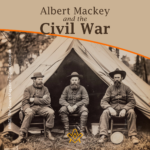 Albert Mackey and the Civil War In the midst of the Civil War's darkness, Dr. Albert G. Mackey, a devoted Freemason, shone a light of brotherhood and peace. Despite the nation's divide, Mackey tirelessly advocated for unity and compassion, embodying Freemasonry's highest ideals—fraternal love and mutual aid. His actions remind us that even in dire times, humanity's best qualities can prevail. |
 Discover the enduring bond of brotherhood at Lodge Dumfries Kilwinning No. 53, Scotland's oldest Masonic lodge with rich historical roots and cultural ties to poet Robert Burns. Experience rituals steeped in tradition, fostering unity and shared values, proving Freemasonry's timeless relevance in bridging cultural and global divides. Embrace the spirit of universal fraternity. |
 Discover the profound connections between John Ruskin's architectural philosophies and Freemasonry's symbolic principles. Delve into a world where craftsmanship, morality, and beauty intertwine, revealing timeless values that transcend individual ideas. Explore how these parallels enrich our understanding of cultural history, urging us to appreciate the deep impacts of architectural symbolism on society’s moral fabric. |
 Discover the incredible tale of the Taxil Hoax: a stunning testament to human gullibility. Unmasked by its mastermind, Leo Taxil, this elaborate scheme shook the world by fusing Freemasonry with diabolical plots, all crafted from lies. Dive into a story of deception that highlights our capacity for belief and the astonishing extents of our credulity. A reminder – question everything. |
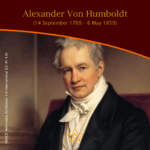 Dive into the extraordinary legacy of Alexander Von Humboldt, an intrepid explorer who defied boundaries to quench his insatiable thirst for knowledge. Embarking on a perilous five-year journey, Humboldt unveiled the Earth’s secrets, laying the foundation for modern conservationism. Discover his timeless impact on science and the spirit of exploration. |
 Voltaire - Freethinker and Freemason Discover the intriguing connection between the Enlightenment genius, Voltaire, and his association with Freemasonry in his final days. Unveil how his initiation into this secretive organization aligned with his lifelong pursuit of knowledge, civil liberties, and societal progress. Explore a captivating facet of Voltaire's remarkable legacy. |
 Robert Burns; But not as we know him A controversial subject but one that needs addressing. Robert Burns has not only been tarred with the presentism brush of being associated with slavery, but more scaldingly accused of being a rapist - a 'Weinstein sex pest' of his age. |
 Richard Parsons, 1st Earl of Rosse Discover the captivating story of Richard Parsons, 1st Earl of Rosse, the First Grand Master of Grand Lodge of Ireland, as we explore his rise to nobility, scandalous affiliations, and lasting legacy in 18th-century Irish history. Uncover the hidden secrets of this influential figure and delve into his intriguing associations and personal life. |
 James Gibbs St. Mary-Le-Strand Church Ricky Pound examines the mysterious carvings etched into the wall at St Mary-Le-Strand Church in the heart of London - are they just stonemasons' marks or a Freemason’s legacy? |
 Freemasonry and the Royal Family In the annals of British history, Freemasonry occupies a distinctive place. This centuries-old society, cloaked in symbolism and known for its masonic rituals, has intertwined with the British Royal Family in fascinating ways. The relationship between Freemasonry and the Royal Family is as complex as it is enduring, a melding of tradition, power, and mystery that continues to captivate the public imagination. |
 A Man Of High Ideals: Kenneth Wilson MA A biography of Kenneth Wilson, his life at Wellington College, and freemasonry in New Zealand by W. Bro Geoff Davies PGD and Rhys Davies |
 In 1786, intending to emigrate to Jamaica, Robert Burns wrote one of his finest poetical pieces – a poignant Farewell to Freemasonry that he wrote for his Brethren of St. James's Lodge, Tarbolton. |
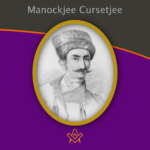 Alex Lishanin explores Mumbai and discovers the story of Lodge Rising Star of Western India and Manockjee Cursetjee – the first Indian to enter the Masonic Brotherhood of India. |
 Aleister Crowley - a very irregular Freemason Aleister Crowley, although made a Freemason in France, held a desire to be recognised as a 'regular' Freemason within the jurisdiction of UGLE – a goal that was never achieved. |
 Sir Joseph Banks – The botanical Freemason Banks was also the first Freemason to set foot in Australia, who was at the time, on a combined Royal Navy & Royal Society scientific expedition to the South Pacific Ocean on HMS Endeavour led by Captain James Cook. |
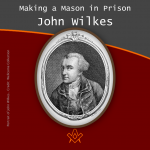 Making a Mason in Prison: the John Wilkes’ exception? |
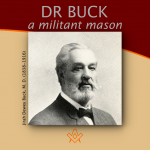 "To be a good man and true" is the first great lesson a man should learn, and over 40 years of being just that in example, Dr Buck won the right to lay down the precept. |
 Elias Ashmole: Masonic Hero or Scheming Chancer? The debate is on! Two eminent Masonic scholars go head to head: Yasha Beresiner proposes that Elias Ashmole was 'a Masonic hero', whereas Robert Lomas posits that Ashmole was a 'scheming chancer'. |
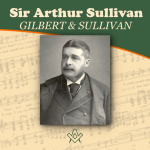 Sir Arthur Sullivan - A Masonic Composer We are all familiar with the comic operas of Gilbert and Sullivan, but did you know Sullivan was a Freemason, lets find out more…. |
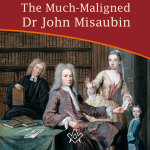 The Much-Maligned Dr John Misaubin The reputation of the Huguenot Freemason, has been buffeted by waves of criticism for the best part of three hundred years. |
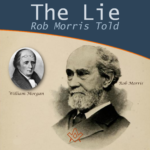 Was William Morgan really murdered by Masons in 1826? And what was the lie Masonic author Rob Morris told? Find out more in the intriguing story of 'The Morgan Affair'. |
 Lived Respected - Died Regretted Lived Respected - Died Regretted: a tribute to HRH The Prince Philip, Duke of Edinburgh |
 Who was Moses Jacob Ezekiel, a Freemason, American Civil War Soldier, renowned sculptor ? |
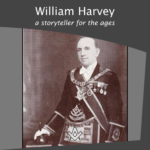 A Masonic author and Provincial Grand Master of Forfarshire in Scotland |
 Who was Philip, Duke of Wharton and was he Freemasonry’s Loose Cannon Ball ? |
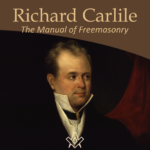 Richard Carlile - The Manual of Freemasonry Will the real author behind The Manual of Freemasonry please stand up! |
 Nicholas Hawksmoor – the ‘Devil’s Architect’ Nicholas Hawksmoor was one of the 18th century’s most prolific architects |
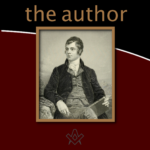 By Bro. Anthony Oneal Haye (1838-1877), Past Poet Laureate, Lodge Canongate Kilwinning No. 2, Edinburgh. |
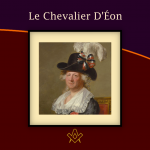 The Curious Case of the Chevalier d’Éon A cross-dressing author, diplomat, soldier and spy, the Le Chevalier D'Éon, a man who passed as a woman, became a legend in his own lifetime. |
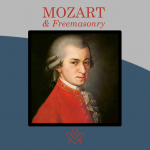 Mozart Freemasonry and The Magic Flute. Rev'd Dr Peter Mullen provides a historical view on the interesting topics |
masonic knowledge
to be a better citizen of the world
share the square with two brothers

click image to open email app on mobile device









